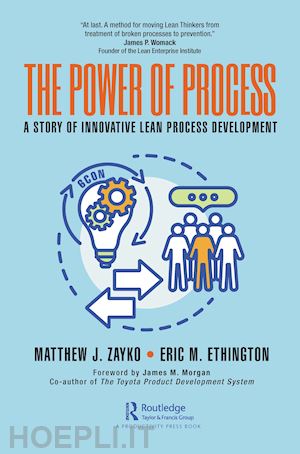Lean Process Creation teaches the specific frames—the 6CON model—to look through to properly design any new process while optimizing the value-creating resources. The framing is applicable to create any process that involves people, technology, or equipment—whether the application is in manufacturing, healthcare, services, retail, or other industries. If you have a process, this approach will help. The result is 30% to 50% improvement in first-time quality, customer lead time, capital efficiency, labor productivity, and floorspace that could add up to millions of dollars saved per year. More important, it will increase both employee and customer satisfaction. The book details a case study from a manufacturing standpoint, starting with a tangible example to reinforce the 6CON model. This is the first book written from this viewpoint—connecting a realistic transformation with the detailed technical challenges, as well as the engagement of the stakeholders, each with their own bias. Key points and must-do actions are sprinkled throughout the case study to reinforce learning from the specific to the general. In this study, an empowered working team is charged with developing a new production line for a critical new product. As the story unfolds, they create an improved process that saves $5.6 million (10x payback on upfront resource investment) over the short life cycle of the product, as well as other measurable benefits in quality, ergonomics, and delivery. To an even greater benefit, they establish a new way of working that can be applied to all future process creation activities. Some organizations have tried their version of Lean process design following a formula or cookie-cutter approach. But true Lean process design goes well beyond forcing concepts and slogans into every situation. It is purposeful, scientific, and adaptable because every situation starts with a unique current state. In addition, Lean process design must include both the technical and social aspects, as they are essential to sustaining and improving any system. Observing the recurring problem of reworking processes that were newly launched brought the authors to the conclusion that a practical book focused on introducing the critical frames of Lean process creation was needed. This book enables readers to consider the details within each frame that must be addressed to create a Lean process. No slogans, no absolutes. Real thinking is required. This type of thinking is best learned from an example, so the authors providethis case study to demonstrate the thinking that should be applied to any process. High volume or low, simple or complex mix, manufacturing or service/transactional—the framing and thinking works. Along with the thinking, readers are enabled to derive their own future states. This is demonstrated in the story that surrounds the case study.











